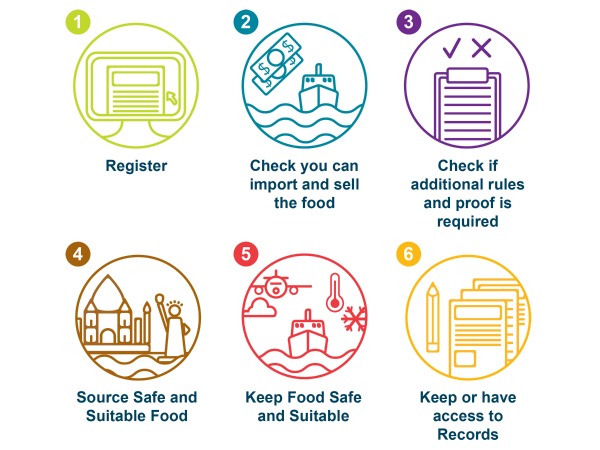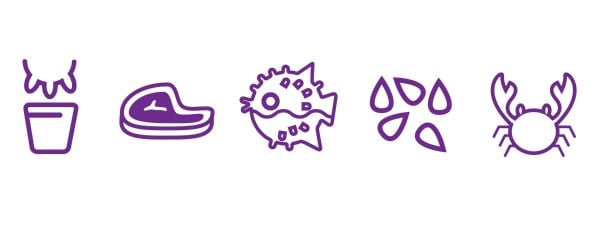
What You Must Know Before You Import Food into NZ
5-minute read
What is this about?
To import food into New Zealand (NZ) for sale individuals need to understand and comply with requirements under the Food Act 2014. This guidance will help you with this.
Who should read it?
Any person or business wanting to bring food into New Zealand for sale.
Examples:
• A New Zealand resident wanting to import food into NZ.
• A person or business based in another country wanting to import food into NZ.
• An import broker or agent importing food into NZ.
Why should you read it?
• So you understand how to ensure food imported for sale in New Zealand is safe for people to eat. You could be fined or even jailed if you sell food that is not safe and suitable.
• To make sure you do not have to recall product which can be costly.
• To make sure you can continue to import.
What do you need to do?
On the next picture is an outline of the steps you will need to complete to successfully register and import food into New Zealand.

1. Register
When
From 1st March you must register to import food into New Zealand or use a registered agent . The registered importer must be a New Zealand resident.
Why
• So MPI (Ministry for Primary Industries) knows who is importing food and how to contact them.
• So the public knows who is importing (The list of registered importers is on the MPI website).
How
Tick that you want to be an importer under the Food Act when you complete your TSW — Client Application Form with Customs.
You will need to renew annually. MPI will send a reminder. Keep your contact details up to date to ensure you recieve it.
Cost
MPI will invoice you.
2. Check You Can Import and Sell the Food
Why
Some foods can not be bought into New Zealand. You will not be able to bring in endangered plants or animals and some food considered of too great of a risk to the NZ environment, plants and animals or people.
If you ship such food to New Zealand you may need to ship it back out of NZ or it may be destroyed.
Check
• The information at the NZ Customs website on Prohibited imports. This lists things that cannot be imported . E.g. endangered species.
• That there is an Import Health Standard (IHS) for the Food (MPI website). This outlines controls to protect the NZ environment, plants and animals. If there is no IHS then you will not be able to import it.
3. Check If Additional Rules or Proof Is Required
Why
Some foods pose a higher risk to people’s health or the New Zealand environment, plants and animals. There are additional rules for these foods, and you may need to get permission from MPI to import them.
This permission is called ‘clearance’.
• You will need biosecurity clearance (for plants and animals).
• You may need food safety clearance (for people’s health).
If you cannot provide the correct proof, or the food does not meet the requirements, you may need to ship it back out of New Zealand or it may be destroyed.
Check this information on the MPI website:
• The rules and checks listed in the Import Health Standards.
• Rules and checks for food that needs food safety clearance (these are called ‘high regulatory interest foods, or ‘increased regulatory interest foods’).

4. Source Safe and Suitable Food
You must
Check and make sure that the food you are planning to import is safe and suitable.
Why
Food is not always safe. It needs to be handled in ways that make sure it is safe. It is your job to make sure that it is and prove that you have done so.
How
Look at the food business and the details of the food. You could ask for:
• A certificate that shows the business complies with a food safety programme in their country.
• Proof that the food business is registered with a food safety authority.
• The product details – chemical, physical and microbiological quality.
• Proof that the food will comply with the Australia New Zealand Food Standards Code.
5. Keep Food Safe and Suitable
You need to keep the food safe from start to finish this includes making sure it is stored and transported correctly.
You must
Do your best to make sure that the food is:
• Kept at the correct temperature and that temperature is controlled correctly. For example frozen meat should remain frozen.
• Protected from pests such as rats and mice.
• Kept separate from other products that may contaminate the food.
Do your best to make sure:
• Packaging is clean and safe.
• Damage to packaging is prevented.
• Where bulk containers are used that they are cleaned before use.
Why
Food can become dangerous if it is not looked after properly. It is your job to prove that you have done your best to make sure the food is safe to eat.
How
The contract with the transport and storage companies can cover the requirements above or you could:
• Ask for other written information about these things.
• Visit the company and check these things.
6. Keep or have access to Records
You must
Keep, or have easy access to, records that show:
• You have done your best to source, transport and store food correctly so that it is safe and suitable.
• You know what was imported, where it came from, and where it was sold.
Why
• To prove that you have met your requirements and ensure you can continue to import.
• To make sure you can recall (i.e. find and remove from sale) any food that is not safe and suitable.
How
You can either put in place a system to keep all the records yourself or contract someone else to do this.
If you contract it out you should review the systems in place or obtain written assurances from the contracted party that they will keep all records needed.
You should run tests to make sure you can provide information quickly.
More information can be found on the NZ Customs and MPI websites:
https://www.customs.govt.nz/business/import/
www.mpi.govt.nz/importing
Source: Ministry of Primary Industries
We’d love to answer any of your questions! Contact us now
P.S. Do you know of other people that will find this article useful? Please share it on social media. Thank you!
